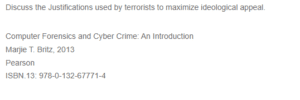Justifications Used by Terrorists to Maximize Ideological Appeal
Terrorism is characterized by violence, lack of moral restraints, victimization of innocents, advance planning, serial or methodical operations, attempts to gain attention, political demands, and instilling fear and unpredictability (Britz, 2013). According to Venhaus (2010), terrorism is driven by ideology. An ideology can be an emotionally and intellectually appealing idea to many people, especially those looking for meaning in their lives. Most terrorist activities are linked to religious ideologies that add a spiritual dimension to people’s appeal to seek a purpose, thus making them more powerful motivators for action and justifying a person’s need to be violent to save the world, oneself, or the family while fulfilling the will of a spiritual being. In some instances, individuals engage in terrorism because they have a vision for the future they desire, which they do not believe can be achieved without violence. The vision is developed through a set of values, ideas, and ideology to inspire action and justify using violence in pursuing the intended future. Do you need help with your assignment ? Hire our assignment writing services in case your assignment is devastating you.
One of the justifications used by terrorists to maximize ideological appeal is challenging the norms of International Humanitarian Law about the distinction between civilian and military targets (Fpifadmin, 2013). The justification assumes that some military personnel are not innocent, thus making them targets of violent acts. This justification has been applied to encourage terrorists to target groups that unlawfully occupy an area acquired by displacing innocent people because the settlers are viewed as beneficiaries or instruments of the unlawfulness of the State. The justification has also been applied to support the assumption that Americans are accountable for the actions of the United States, including hurting innocent people to acquire and sustain power (Fpifadmin, 2013). This view threatens many innocent people regardless of whether they had a role in the State’s unlawfulness. Terrorists guided by this justification also target the United Nations or its employees because of its role in promoting the occupation of the United Nations in Iraq, thus creating a perspective that, in the end, exposes everyone to terrorist attacks despite their political beliefs, occupation, nationality, and religious affiliation.
The second justification is that terrorist acts are a moral right for people who have been wronged. According to Fpifadmin (2013), the consideration of terrorism as a moral right is evident in terrorism in Palestine when Palestinians were attacking Israel. Terrorism was viewed as the only effective way of freeing Palestine from the domination of the Israelis. The foundation of this justification is that the right to self-determination does not have meaning without a remedy, thus making terrorism a thought that can be justified where there is a decent possibility of accomplishing the desired end at a worthy cost. Therefore, terrorism is viewed as the most effective weapon available to the disempowered and the weak who are not in any position to win by regular means against modern, well-resourced and militarized States (Fpifadmin, 2013). This justification supports the use of terrorism in weakening countries such as the United States, which has been a major target for terrorist activities such as bombings and assassinations. Extremist groups use this justification to recruit terrorists and suicide bombers by appealing to their need for revenge identity and status. Revenge seekers are willing to do anything they can to get their revenge when they are convinced that their actions are morally right. Status and identity seekers are satisfied with the idea that they belong to a group pursuing a noble cause, thus developing a sense of belonging. Therefore, the right moral justification is most prevalent in the recruitment of terrorists and coordination of terrorist activities.
References
Britz, M. (2013). Computer Forensics and Cyber Crime: An Introduction (3rd ed.). Prentice Hall.
Fpifadmin. (2013, June 12). Two justifications for terrorism: A moral, legal response. Foreign Policy In Focus. https://fpif.org/two_justifications_for_terrorism_a_moral_legal_response/
Venhaus, J. (2010). Why Youth Join al-Qaeda (236). United States Institute of Peace. https://www.usip.org/sites/default/files/resources/SR236Venhaus.pdf
ORDER A PLAGIARISM-FREE PAPER HERE
We’ll write everything from scratch
Question

Justifications Used by Terrorists to Maximize Ideological Appeal
Discuss the Justifications used by terrorists to maximize ideological appeal.
Computer Forensics and Cyber Crime: An Introduction
Marjie T. Britz, 2013
Pearson
ISBN.13: 978-0-132-67771-4

